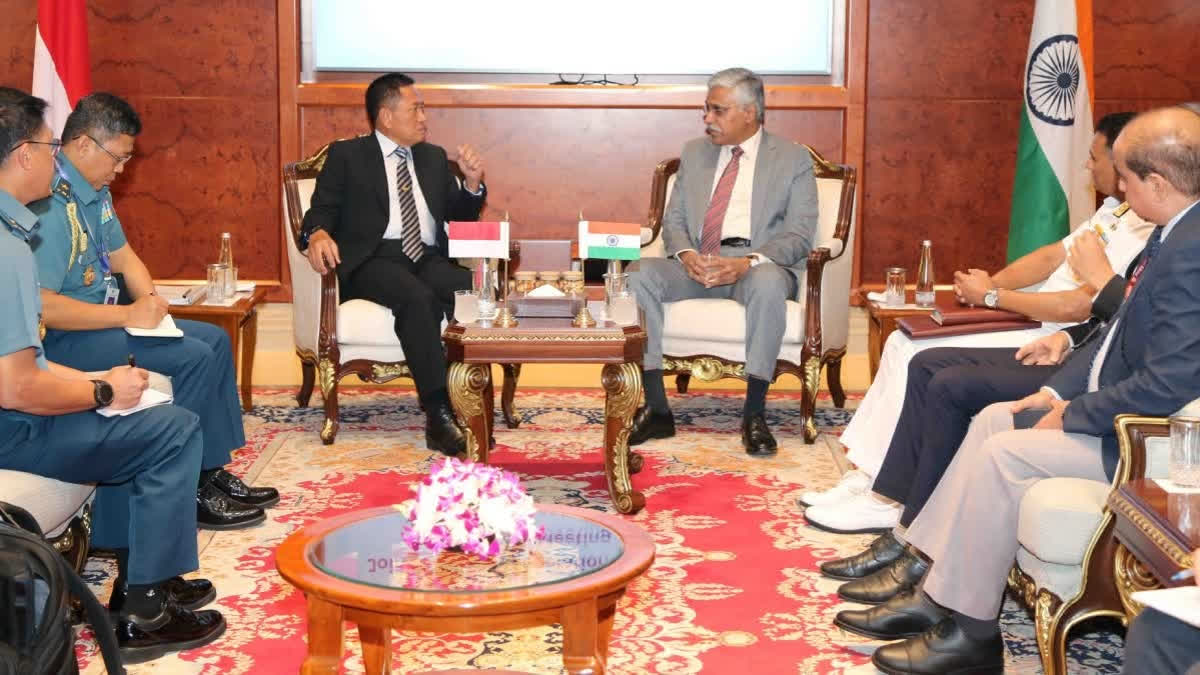New Delhi: After a gap of nearly six years, India and Indonesia held the seventh Joint Defence Cooperation Committee (JDCC) meeting here on Friday. According to a statement issued by the Defence Ministry, Defence Secretary Giridhar Aramane and Indonesia’s Secretary General of the Ministry of Defence Air Marshal Donny Ermawan Taufanto co-chaired the JDCC meeting during which both sides expressed satisfaction at the expanding scope of defence cooperation between the two countries.
“The progress made on various bilateral defence cooperation initiatives deliberated in meetings of working groups on defence cooperation and defence industries cooperation was also reviewed by the co-chairs,” the statement read. The last India-Indonesia JDCC meeting was held in New Delhi in 2018.
Why is the India-Indonesia defence cooperation important geopolitically?
India and Indonesia elevated their strategic partnership to the level of ‘Comprehensive Strategic Partnership’ in 2018. Both countries also signed the Defence Cooperation Agreement. India and Indonesia share ‘Vision on Maritime Cooperation’. The bilateral relationship was deepened since the visit of Prime Minister Narendra Modi to Jakarta in September 2023 and Indonesian President Joko Widodo to New Delhi for the G20 Leaders’ Summit held under India’s presidency in September 2023.
This defence cooperation is marked with regular India-Indonesia Coordinated Patrol (IND-INDO-CORPAT), bilateral army and naval exercises such as Garuda Shakti and Samudra Shakti. The IND-INDO-CORPAT entered its 41st edition in 2023. On April 30, 2024, the first-ever India-Indonesia Defence Industry Seminar and Exhibition was organised in Jakarta, which showcased the Indian defence industry and explored the potential for partners. T Natarajan, Director General (Defence Production) of the Government of India led the Indian delegation to the landmark event in which more than 50 Indian companies participated. Indian defence exports have grown from $560 million in 2017 to $2.63 billion in 2023.
India and Indonesia, the two largest democracies and economies in the Association of Southeast Asian Nations (ASEAN) region, have been steadily enhancing their defence cooperation in recent years. This defence partnership holds significant importance for both countries and the broader region, given their strategic locations, economic clout and shared maritime interests.
“Indonesia is an immediate maritime neighbour of India,” K Yhome, a fellow at the Shillong-based Asian Confluence think tank, told ETV Bharat. “The two countries share the Bay of Bengal,” Yhome explained that about 80 per cent of the energy exports to East Asia pass through the Bay of Bengal.
“The Bay of Bengal is a strategically important Sea Link of Communication (SLOC) for all the countries in the region,” he said. “In this context, it is very important for India and Indonesia to keep this SLOC secured, and open, and to ensure that no hostile country or entity chokes this.” India and Indonesia are maritime nations with strategic locations along SLOCs such as the Strait of Malacca and the Indian Ocean. Cooperation in maritime security, including joint naval exercises, sharing of intelligence, and coordinated patrols, helps safeguard vital SLOC and combat maritime threats like piracy, smuggling and terrorism.
Also, given their geographical locations, India and Indonesia are prone to natural disasters like earthquakes, tsunamis and cyclones. Joint preparedness, disaster relief operations and the sharing of best practices in disaster management can significantly enhance the resilience and response capabilities of both nations. Collaboration in this area strengthens civil-military cooperation and reinforces the humanitarian aspects of defence cooperation.
“This sort of exchange between India and Indonesia helps both countries in Humanitarian Assistance and Disaster Relief (HADR) efforts,” Yhome said. “The Bay of Bengal is one of the most turbulent seas in terms of cyclones and weather disturbances.”
The China factor
The defence cooperation between India and Indonesia has become all the more important in the context of China’s belligerence and territorial claims in the South China Sea. Both nations share concerns over China’s growing military presence and aggressive behaviour in this strategically vital maritime region.
The South China Sea is a crucial international waterway, with trillions of dollars worth of global trade passing through it annually. India and Indonesia, as maritime nations heavily reliant on unimpeded maritime trade, have a shared interest in maintaining freedom of navigation and overflight in the South China Sea.
Their joint naval exercises, coordinated patrols and intelligence sharing help promote a rules-based maritime order and deter any attempts to restrict or disrupt the free flow of maritime traffic.
China’s construction of artificial islands, militarisation of disputed features and excessive maritime claims in the South China Sea have raised concerns about its long-term strategic ambitions. India and Indonesia, as stakeholders in the region's stability, can leverage their defence cooperation to counterbalance China’s growing assertiveness and discourage further unilateral actions that violate international law. Their partnership sends a strong signal that any attempts to undermine regional peace and security will be met with a united front.
Yhome pointed out that China has aggressively its ties with the Indian Ocean littoral nations. “China has opened naval bases in Djibouti in the Horn of Africa and Cambodia,” he said. “India in South Asia and Indonesia in Southeast Asia have the most powerful militaries in the region. Both are located along very strategic SLOCs. They want to ensure that these areas remain under their control and no other foreign power comes in between.”
It is worth mentioning here that Indonesia, as a member of the Association of Southeast Asian Nations (ASEAN), plays a crucial role in upholding the organisation’s centrality in the regional security architecture. India’s support for ASEAN’s position on the South China Sea dispute, through its defence cooperation with Indonesia, strengthens the regional bloc’s collective bargaining power and credibility. This partnership reinforces the principles of peaceful dispute resolution, adherence to international law, and respect for the sovereign rights of littoral states.



